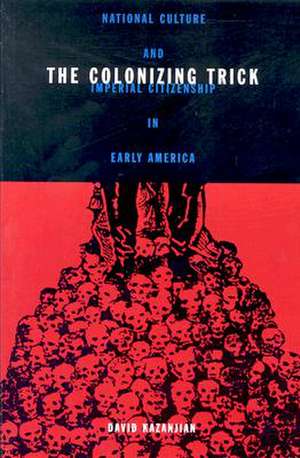Colonizing Trick: National Culture And Imperial Citizenship In Early America: Critical American Studies
Autor David Kazanjianen Limba Engleză Paperback – 12 dec 2003
An illuminating look at the concepts of race, nation, and equality in eighteenth- and nineteenth-century America
The idea that “all men are created equal” is as close to a universal tenet as exists in American history. In this hard-hitting book, David Kazanjian interrogates this tenet, exploring transformative flash points in early America when the belief in equality came into contact with seemingly contrary ideas about race and nation. The Colonizing Trick depicts early America as a white settler colony in the process of becoming an empire-—one deeply integrated with Euro-American political economy, imperial ventures in North America and Africa, and pan-American racial formations.
Kazanjian traces tensions between universal equality and racial or national particularity through theoretically informed critical readings of a wide range of texts: the political writings of David Walker and Maria Stewart, the narratives of black mariners, economic treatises, the personal letters of Thomas Jefferson and Phillis Wheatley, Charles Brockden Brown’s fiction, congressional tariff debates, international treaties, and popular novelettes about the U.S.–Mexico War and the Yucatán’s Caste War. Kazanjian shows how emergent racial and national formations do not contradict universalist egalitarianism; rather, they rearticulate it, making equality at once restricted, formal, abstract, and materially embodied.
The idea that “all men are created equal” is as close to a universal tenet as exists in American history. In this hard-hitting book, David Kazanjian interrogates this tenet, exploring transformative flash points in early America when the belief in equality came into contact with seemingly contrary ideas about race and nation. The Colonizing Trick depicts early America as a white settler colony in the process of becoming an empire-—one deeply integrated with Euro-American political economy, imperial ventures in North America and Africa, and pan-American racial formations.
Kazanjian traces tensions between universal equality and racial or national particularity through theoretically informed critical readings of a wide range of texts: the political writings of David Walker and Maria Stewart, the narratives of black mariners, economic treatises, the personal letters of Thomas Jefferson and Phillis Wheatley, Charles Brockden Brown’s fiction, congressional tariff debates, international treaties, and popular novelettes about the U.S.–Mexico War and the Yucatán’s Caste War. Kazanjian shows how emergent racial and national formations do not contradict universalist egalitarianism; rather, they rearticulate it, making equality at once restricted, formal, abstract, and materially embodied.
Preț: 132.60 lei
Preț vechi: 163.74 lei
-19% Nou
Puncte Express: 199
Preț estimativ în valută:
25.37€ • 27.13$ • 21.16£
25.37€ • 27.13$ • 21.16£
Comandă specială
Livrare economică 28 martie-09 aprilie
Doresc să fiu notificat când acest titlu va fi disponibil:
Se trimite...
Preluare comenzi: 021 569.72.76
Specificații
ISBN-13: 9780816642380
ISBN-10: 0816642389
Pagini: 400
Ilustrații: None
Dimensiuni: 149 x 229 x 18 mm
Greutate: 0.43 kg
Ediția:First edition
Editura: University of Minnesota Press
Colecția Univ Of Minnesota Press
Seria Critical American Studies
Locul publicării:United States
ISBN-10: 0816642389
Pagini: 400
Ilustrații: None
Dimensiuni: 149 x 229 x 18 mm
Greutate: 0.43 kg
Ediția:First edition
Editura: University of Minnesota Press
Colecția Univ Of Minnesota Press
Seria Critical American Studies
Locul publicării:United States
Notă biografică
David Kazanjian is associate professor of English, Queens College, and visiting associate professor of English, The Graduate Center, City University of New York.
















